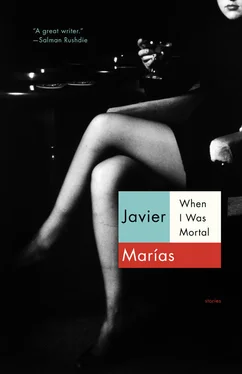Javier Marias - When I Was Mortal
Здесь есть возможность читать онлайн «Javier Marias - When I Was Mortal» весь текст электронной книги совершенно бесплатно (целиком полную версию без сокращений). В некоторых случаях можно слушать аудио, скачать через торрент в формате fb2 и присутствует краткое содержание. Год выпуска: 2012, Издательство: Vintage Espanol, Жанр: Современная проза, на английском языке. Описание произведения, (предисловие) а так же отзывы посетителей доступны на портале библиотеки ЛибКат.
- Название:When I Was Mortal
- Автор:
- Издательство:Vintage Espanol
- Жанр:
- Год:2012
- ISBN:нет данных
- Рейтинг книги:3 / 5. Голосов: 1
-
Избранное:Добавить в избранное
- Отзывы:
-
Ваша оценка:
- 60
- 1
- 2
- 3
- 4
- 5
When I Was Mortal: краткое содержание, описание и аннотация
Предлагаем к чтению аннотацию, описание, краткое содержание или предисловие (зависит от того, что написал сам автор книги «When I Was Mortal»). Если вы не нашли необходимую информацию о книге — напишите в комментариях, мы постараемся отыскать её.
. Plots turn on curious exigencies — a woman about to star in her first porn film; a night doctor who adds new meaning to "specialist"; a ghost whose neglect is greatly resented. "In the space of ten or twenty pages," as the
remarked, "Marías contrives to write a novel." "The short story fits Marías like a glove," as
noted, and these stories have been acclaimed as "dazzling" (
); "formidably intelligent" (
); and "startling" (
).
When I Was Mortal — читать онлайн бесплатно полную книгу (весь текст) целиком
Ниже представлен текст книги, разбитый по страницам. Система сохранения места последней прочитанной страницы, позволяет с удобством читать онлайн бесплатно книгу «When I Was Mortal», без необходимости каждый раз заново искать на чём Вы остановились. Поставьте закладку, и сможете в любой момент перейти на страницу, на которой закончили чтение.
Интервал:
Закладка:
In Paris he’d married a woman called Eliane (he always referred to her by name, I never once heard him call her “my wife”), who, according to him, had the most exquisite colour sense he’d ever come across in a fellow human being (I didn’t ask at the time, but I presumed that she must be a painter). He had a wide-ranging and ambitious literary plan of which, he remarked precisely, he had so far completed about twenty per cent, although none of it had as yet been published. Apart from the people closest to him, I was the first person to have shown any interest in his writings, which comprised novels, essays, sonnets and plays, even a play for puppets. He obviously thought that my opinion held considerable sway at the head office of the publishing house, not realizing that mine was only one voice amongst many and, given my youth, far from being one of the most influential. He gave me the impression that he was reasonably happy, whatever that means: he seemed to be very much in love with his wife; he was living in Paris whereas, in Spain, we were only just getting over Franco, or so people said; he didn’t have to work, his only obligations being those he imposed upon himself; and he doubtless enjoyed a pleasant and interesting social life. And yet, even at our first meeting, I sensed something turbulent and uneasy about him, as if he were surrounded by a cloud of suffering, like a cloud of dust, that gradually gathered about him only to be shaken off afterwards and left behind. When he described to me the amount of work he put into his writing, the endless hours spent labouring over every one of those pages I had read, I thought it was nothing more than that, a concept of writing as old-fashioned as he was himself, a concept that was almost “pathetic”, in the original sense of that word: a summoning up of the pain required to make words, regardless of meaning, communicate intense emotion, the way, he said, that music or pure colour do, or the way mathematics is supposed to. I asked him if he’d also spent hours on one of his rather easier pages to remember, which consisted of the word “riding” repeated five times on each line, thus:
riding riding riding riding riding
He looked at me with ingenuous eyes, surprised, and then, after a few seconds, he burst out laughing: “No,” he said, “of course I didn’t.” Then he added, with unexpected simplicity: “You do say some funny things,” and started laughing again.
He was always rather slow on the uptake when it came to the jokes or, rather, the gentle leg-pulls I allowed myself, especially later on, simply as a way of lessening the intensity of whatever he was telling me. It was as if he didn’t immediately understand the ironic register, as if that too required translation, but then, after a few seconds of bewilderment or assimilation, he would laugh out loud — his laughter was almost femininely openhearted — as if amazed that anyone were capable of making a joke in the middle of a serious, not to say solemn or even dramatic, conversation, and he really appreciated it, both the joke and the capability. This is often the case with people who believe they haven’t an ounce of frivolity in them; he did, he simply didn’t know it. When I saw his reaction, I ventured another funny remark (I should perhaps explain that this is my principal way of demonstrating my liking and affection for someone), and later I said to him: “The only thing that’s lacking for your life to be idyllic, the sort of life led by characters in a Scott Fitzgerald story before everything turns sour, is for one of your books to be published.” His face darkened slightly at this and I thought that perhaps this was caused by my mention of Fitzgerald, an author who was of even less interest to him than he was to me. He answered me gravely: “It’s more a question of excess than lack.” He paused theatrically, as if debating whether or not to tell me what he was clearly burning to say. I kept silent. So did he (he could withstand silence better than anyone I knew); I broke first. I said: “What do you mean?” He waited a little longer before replying and then announced: “I suffer from melancholia.” “Well, I never,” I said, unable to suppress a smile, “people who suffer from that are usually people who feel they’re over-privileged. But it’s such a very ancient illness, it can’t be that serious, nothing classical ever is, wouldn’t you agree?”
There was rarely any ambiguity in what he said and he hastened to clear up what he judged to have been a misunderstanding. “I suffer, more or less continually, from depressive melancholia,” he said. “I’m on medication all the time. That keeps it under control, but if I stopped taking the medication, I would almost certainly kill myself. I already tried to do so once, before I came to live in Paris. It wasn’t that any particular misfortune had befallen me, I was just in such terrible mental pain that I couldn’t bear to go on living. That could happen to me again at any moment and would happen were I to stop taking the medication. At least that’s what they tell me and I imagine they’re probably right, after all, I’m a doctor too.” He wasn’t being melodramatic, he spoke about it quite dispassionately, in the same tone in which he’d told me about everything else. “What happened?” I asked. “I was staying at my father’s country house in Gerona, near Cassá de la Selva. I aimed a rifle at my chest, holding the rifle butt between my knees. My hands started shaking, I lost my grip, and the bullet embedded itself in a wall instead. I was too young,” he added, by way of an excuse, and gave me an amiable smile. He was a very considerate man and insisted on paying the bill.
We began writing to each other and met whenever I visited Paris. I went there, in order to get over some upset or other, only a few months after our first meeting. I used to stay with an Italian friend, a woman whom I’ve always found amusing and who has, therefore, always been a source of consolation to me. At the time, the company of Xavier Comella simply interested and entertained me, later it became something that demanded repetition, as happens with those people one comes to count on, even in their absence.
At the time, Xavier was living in his father-in-law’s house with his wife Eliane, who was French by birth but Chinese in appearance. She was almost depressingly delicate in the way oriental women are who pride themselves on their refinement, and she was certainly refined. Her fantastic colour sense, so highly praised by her husband, was not deployed on any canvas, but in interior design, although it seemed to me that, up until then, she’d worked mainly on the houses of friends and acquaintances rather than for actual clients, as well as on the design of the restaurant owned by her father, Xavier’s father-in-law, a restaurant I never visited but which, according to Xavier, was “the finest Chinese restaurant in France”, not that that’s saying very much. When he was with his wife, the natural attentiveness of this man who was in the process of becoming my friend became so exaggerated that, at times, it proved positively irritating: he would ask me not to smoke because cigarette smoke made her feel sick; in cafés we always had to sit out on the covered terraces both to avoid the cigarette smoke and because the air circulated more freely there; we also had to sit so that her back was to the pavement, because the sight of the traffic made her dizzy; we could never go anywhere, not even to a cinema that was even half full, because Eliane was afraid of crowds, nor of course could we ever go to a cellar bar or a night club because that gave her claustrophobia; we also had to avoid any large open spaces, such as the Place Vendôme, because she suffered equally badly from agoraphobia; she couldn’t walk or remain standing for any longer than it takes for the lights to change and, if there was a queue at the theatre or a museum, even if it was only for a matter of minutes, Xavier would have to accompany Eliane to the nearest café and deposit her there — having first checked that there was no other threat to her safety (this took some time since the threats were so various) — in order that she could wait, seated and safe. What with one thing and another, by the time he got back to me in the queue to keep me company in my slow advance, I’d already got the tickets and we had to go back and find her. By then, of course, she would have ordered some tea and we would have to wait while she drank it. On more than one occasion the show began without us or we were obliged to go round the museum at lightning speed. Going out with the two of them together was rather trying, not only because of all these obligations and inconveniences, but also because adoration is never a pretty sight, still less so when the person doing the adoring is a person for whom one feels a certain regard. It inspires a sense of shame, of embarrassment and, in the case of Xavier Comella, it was like being present at a display — albeit partial — of the most deeply felt corner of his private life, something we can tolerate only in ourselves — just as we can only bear the sight of our own blood, our own nail clippings. And it was perhaps all the more embarrassing because, when you met Eliane, you could understand, or at least imagine, why he felt that way. It wasn’t that she was an extraordinary beauty, nor was she exactly talkative (of course, she never asked for or complained about anything because that would have been out of keeping with her refined nature, neither was it necessary: Xavier was a solicitous and punctilious interpreter of her every need). My memory of her is of an utterly vague figure, but her principal charm — which was considerable — probably lay in the fact that, even when she was there before you, she felt like a memory, a blurred and tenuous memory and, as such, harmonious and peaceful, soothing and faintly nostalgic, impossible to grasp. Holding her in your arms must have been like embracing something one has lost, as sometimes happens in dreams. Xavier told me once that he’d been in love with her since he was fourteen years old, I didn’t dare ask how or where they’d met at such a tender age, but then I don’t ask many questions. A single image of the two of them together predominates over all the others. One morning, we visited an open-air market selling flowers and plants; it began to rain really rather hard, but because the excursion had been specially arranged so that Eliane could buy, amongst other things, the first peonies of the year, no one even considered looking for shelter, not that there was any, instead Xavier opened his umbrella and took enormous pains to ensure that not a single drop of rain fell on her as she continued on her meticulous and unalterable course, with Xavier following always a couple of paces behind, holding his waterproof vault above her and getting soaked in the process, like a devoted servant inured to such things. I brought up the rear, umbrella-less but not daring to abandon the cortège, like a servant of a lower rank, less committed and quite unrewarded.
Читать дальшеИнтервал:
Закладка:
Похожие книги на «When I Was Mortal»
Представляем Вашему вниманию похожие книги на «When I Was Mortal» списком для выбора. Мы отобрали схожую по названию и смыслу литературу в надежде предоставить читателям больше вариантов отыскать новые, интересные, ещё непрочитанные произведения.
Обсуждение, отзывы о книге «When I Was Mortal» и просто собственные мнения читателей. Оставьте ваши комментарии, напишите, что Вы думаете о произведении, его смысле или главных героях. Укажите что конкретно понравилось, а что нет, и почему Вы так считаете.












